A Crazy Idea: Redefining Entertainment in the Age of COVID
You probably remember exactly where you were and what you were doing when you first heard about the attacks on September 11, 2001. Whether you were in class, at work, walking to the bus, maybe having breakfast, the details of that morning are likely still fresh in your mind. September 11th and other events that we remember like this are called flashbulb memories – it’s as if you’ve stored a snapshot of that moment in your mind. Flashbulb memories are incredibly vivid, detailed and we carry them with us most of our lives.
Where were you when you first heard about the “novel coronavirus,” as it was known last year? If you’re like most people, you may recall early reports of the mysterious pneumonia that was affecting citizens in Wuhan, China. But you probably cannot pinpoint the first news story you heard about it last January (or was it February?).
Where were you when you heard that Tom Hanks had contracted COVID-19? Or when the NBA had halted its season around the same time that same evening? You can probably picture that exact moment vividly. The pandemic was real, the virus was here, and it was going to impact all of us. For Walter Kinzie, CEO of Fort Worth-based Encore Live, and his team of 15 people, the flashbulb memory moment had already come during the prior week when South by Southwest (SXSW), the seminal music and culture festival in Austin, was canceled.
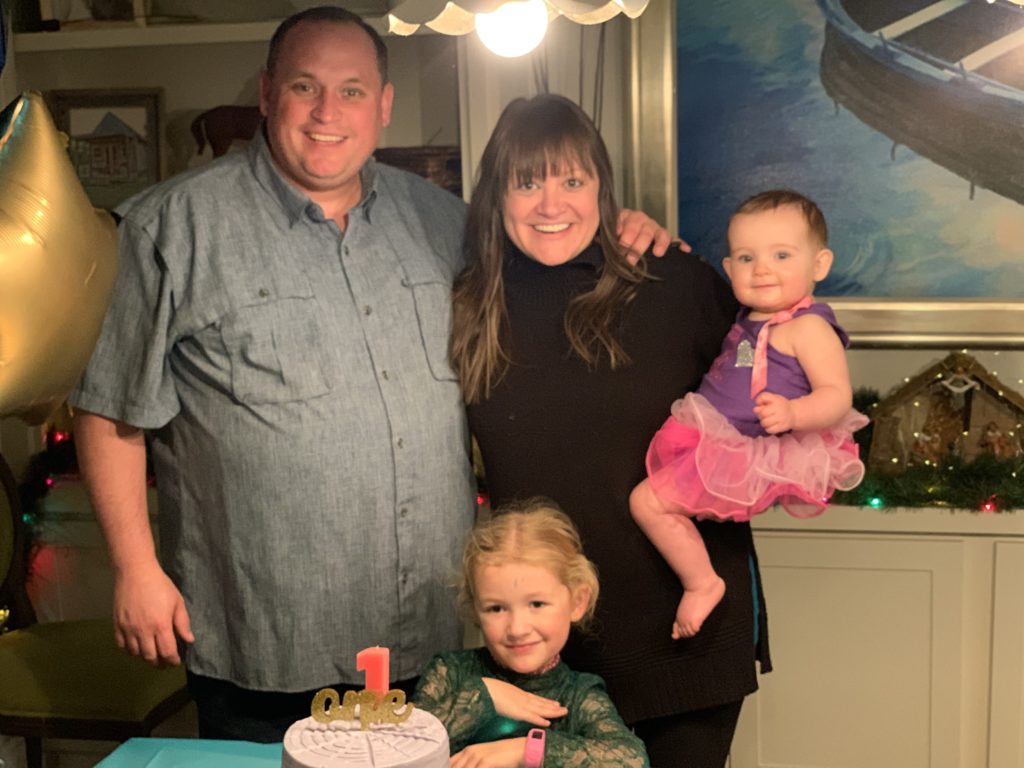
Photo courtesy of Walter Kenzie
“By March 12, we had lost the business,” Kinzie recalled this week via Zoom from the Fort Worth home he shares with his wife and two children. “But the concern really started growing in February when projects were being called into question. By March 6, when South by Southwest was canceled, we were already losing millions of dollars a day.”
Kinzie’s event management company regularly produced multi-million-dollar celebrations and events around the world. It had taken him years to build the business to where it was in early 2020. But it took mere days for it all to be washed away. “It was in a four-day span that we lost everything,” Kinzie said.
From a farm in Kansas to the Presidential Inauguration
Kinzie was born on a small farm outside of Edna, Kansas. He started his first business at just seven years old when he took out a loan to buy a hog for his family’s farm, which he later grew into a successful cattle operation.
While the cattle business grew, Kinzie became interested in live entertainment. “I actually got my first experience in the industry watching my father manage the acts for the local county fair.” At just 18 years old, he put on his first concert, a charity event that raised more than $70,000 for a friend with a terminal illness.
Later that year, his own bout of ill health derailed Kinzie’s entrepreneurial plans for the first time. “I was in my freshman year in college and became ill with a rare kidney condition that forced me to drop out. I had to sell my cattle operation to help pay the medical bills.” That experience was crushing, but it renewed Kinzie’s desire to build a lasting business that also did good in the world. After he recovered from his illness, he accepted a job at Mattress Firm where he went on to become National Sales Manager in charge of 350 stores and revitalized the company’s events series.
After seven years at Mattress Firm, Kinzie paid off the rest of his medical debt and made another change. “I had $500 to my name after paying off the hospital bills and that’s the money I used to create Encore Live.”
Over the next ten years, Encore Live produced large-scale, highly customized projects around the world. Just a few of the company’s notable projects included the launch of Pokemon Go in New York City, the Cotton Bowl at AT&T Stadium in Arlington. as well as groundbreaking events for the Academy of Country Music, Facebook, Capital One, and many others.
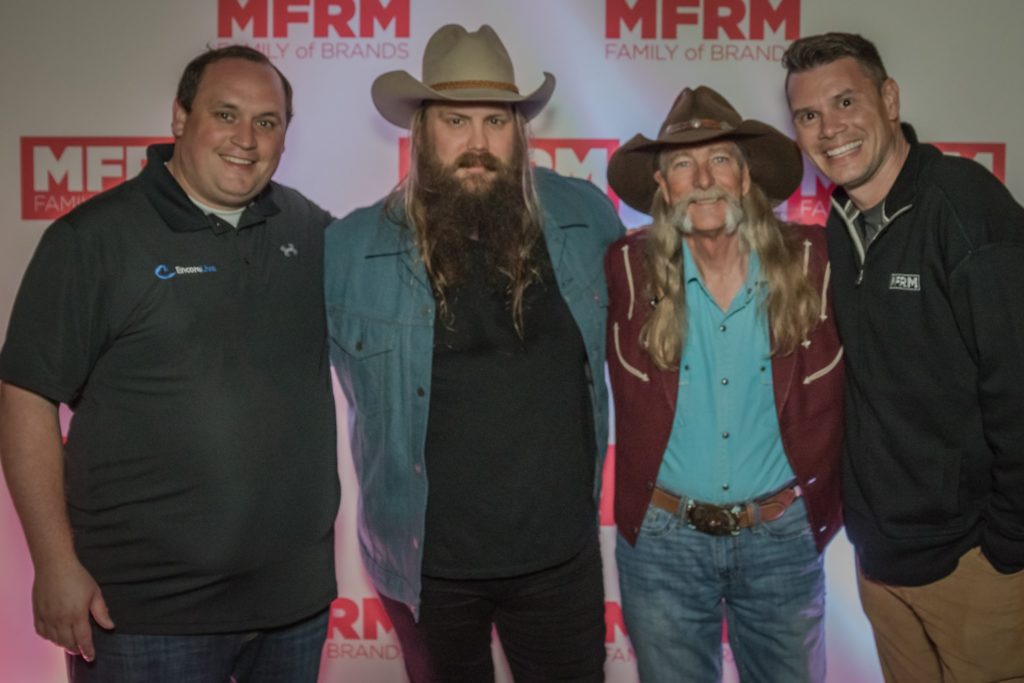
L-R: Walter Kenzie, Chris Stapleton, Dean Dillon, Cory Ludens
Photo courtesy of Walter Kenzie
While its resumé working with major corporations and world–class music venues has received significant attention, it’s Encore Live’s work with some of the world’s highest net worth families that really excites Kinzie. “Our boutique projects were always my favorite because you could really be incredibly creative for the audience,” Kinzie explained. Those events first opened the door for Kinzie and his team to work with some of the country’s biggest stars, including Garth Brooks, George Strait, the Eagles, Ellen, Bon Jovi, and others.
Over the years, Encore Live also worked with a long list of politicians, including Presidents George W. Bush, Barack Obama, Bill Clinton, Jimmy Carter, Joe Biden, and the Trump family. “Not many folks can say they have worked with every living President!” Kinzie said. These relationships ultimately led to Kinzie playing a key role in the 2017 Presidential Inauguration, where he served as co-producer and oversaw the televised transition of power from President Obama to President Trump
“Our entire industry was crumbling.”
All businesses have been forced to overcome challenges related to the pandemic. From remote work to drops in sales or necessary furloughs, no company has been spared. However, the event and live entertainment industry has been hit particularly hard.
In a matter of days at the start of the pandemic, $30 billion worth of events had been canceled in the United States, and over 12,000,000 people in the events and hospitality industry were laid off or furloughed.
“Ironically, the very nature of live events – where something always goes wrong and needs to be solved in real time – actually prepared us relatively well to overcome the challenges of remote work,” Kinzie said smiling, holding his two-year-old daughter Poppy. “But it’s one thing to come up with a solution for a microphone that’s not working or a caterer who prepared the wrong food than it is to figure out how to save the business in the middle of a pandemic!”
Encore held its first Zoom meeting on March 13 to announce that the office was being closed indefinitely and that the company would be focused on identifying ways to pivot the business and sign clients for new revenue streams. “We put on events, but there were no events happening. and other businesses were equally worried about the future. That required sending a clear call to action to our entire team that it was time to get creative.”
“We can lick our chops or lick our wounds – it’s your call,” Kinzie said on that call. “I choose to lick my chops.” Kinzie shared with his team how he believed that today’s most successful businesses have all found opportunity to evolve or gain market share during recessions. He also explained that the company would be putting resources toward supporting the North Central Texas community and the entertainment industry at-large.
“Our entire industry was crumbling,” Kinzie noted. “Businesses might go away, but we felt compelled to do our part to help the industry bounce back.” The Encore Live team quickly started a fundraiser for contract employees in the industry, which gained the support from musicians like Billy Gibbons, Pat Green, and Randy Travis, who donated guitars to be auctioned off. Garth Brooks and the Grammys signed on to help promote the fundraiser, and the donations came pouring in. The fundraiser was a massive success, and grants were paid out to nearly seventy entertainment industry employees who were out of work.
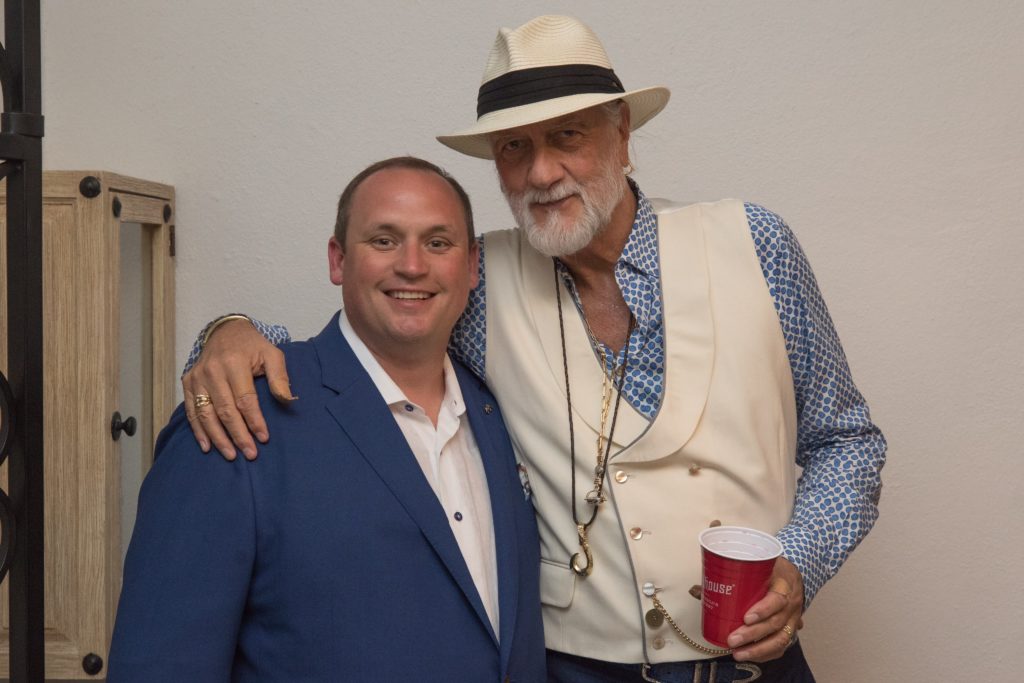
Walter Kenzie & Mick Fleetwood
Photo courtesy of Walter Kenzie
“We felt really driven to have this impact. It helped the team remain focused and gave us an amazing outlet to use our creativity for good,” Kinzie stated. He heard from others in the industry who were shocked that Encore Live was not simply raising money for its own business. “I knew we would find a way to get us back on track. We just had to survive long enough for that moment to arrive.”
Encore Live also focused on helping the local community. Immediately the team began reach out to educational foundations and nonprofits on ways to evolve their fundraising efforts digitally. The company also found itself advising governors, the National Guard, and hospitals on how to quickly scale outdoor emergency facilities to safely activate mobile testing sites equipped to handle the masses, work that Kinzie is clearly very proud of today. “In one minute, we were assisting a struggling musician, and the next, we are huddled up with a governor giving our advice for remote hospitals, morgues, and testing facilities.”
While fundraisers and pro-bono nonprofit work inspired Encore Live’s team, it didn’t pay the bills. “We still needed to figure out how to save the business,” Kinzie recalled.
The “Crazy idea” that redefined entertainment in the COVID era
By May, Encore Live’s cash reserves had run out. Kinzie had sold his home and was working day and night on ways to get the business going again when he set out to create a guide map that would both serve the industry and pivot the company during the pandemic. This was built around the singular goal of providing the American people something to look forward to. “In my mind the goal was clear,” says Kinzie “we were not going to think small, and we would build something special.” It was during a cross-country road-trip that Kinzie had the idea that he thought might actually be what the company needed.
“Thinking back, it might seem obvious now, but this was actually a pretty crazy idea. And we didn’t know if it would work!” Kinzie said, referring to the company’s plans to create an entirely new form of entertainment that would allow musicians to perform for millions of fans in a safe way.
The company would stream world-class musical acts at drive–in theaters around the country.
Kinzie and his team first began discussing the idea for what became the Encore Drive–In Nights concert series in early May. “We were 15 people, and we had to sign up venues, reach agreements with the talent, and pull off these massive shows in just weeks,” Kinzie recalled. “It was a huge endeavor.”
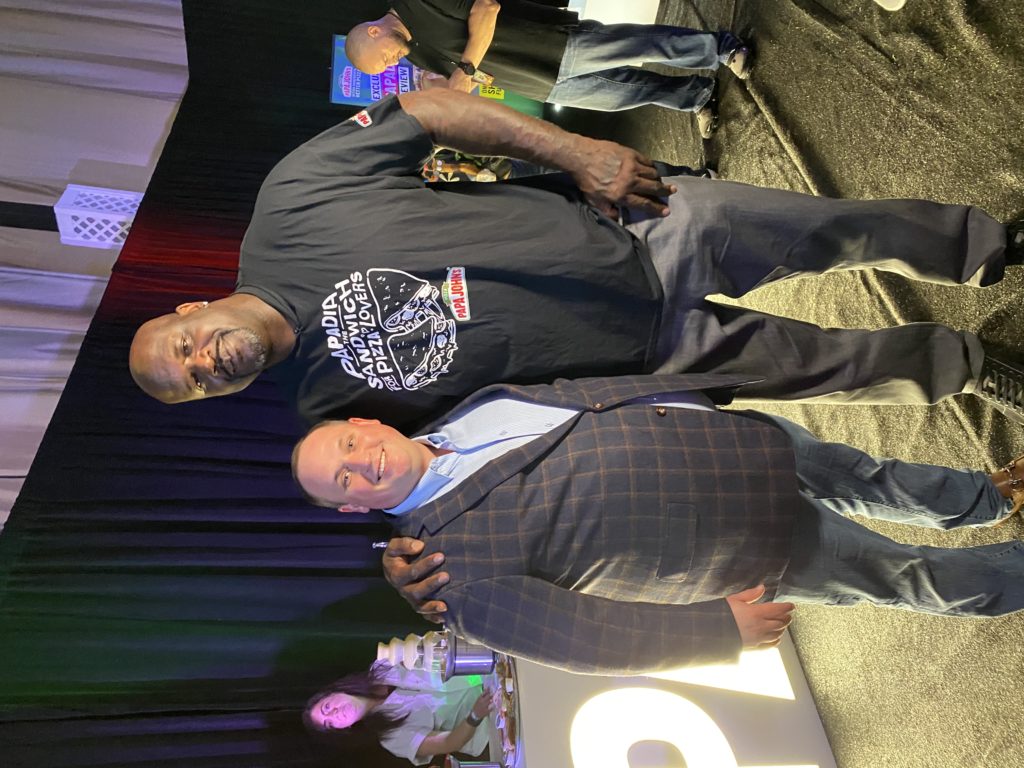
Walter Kenzie & Shaquille O’Neal
Photo courtesy of Walter Kenzie
The company set out signing agreements with hundreds of drive–in and outdoor theaters around the country to stream musical performances. The idea was that fans would be able to pay a set fee for a vehicle with up to six passengers to watch exclusive musical performances on the same night across the country.
The first musical act to sign up for the company’s drive–in shows was Garth Brooks. “I’ve known Garth for a long time, and he’s one of the most innovative, smart, and forward–thinking artists there is,” Kinzie said. “He got it immediately.”
“This is old–school, new–school and perfect for the time we are in,” Brooks said at the time. He appeared on “Good Morning America” to promote the show, and there was a crush of interest from fans. Ticketmaster’s site actually crashed as a result of ticket demand.
“We always knew this would be big, but the demand [of] that first on–sale day surprised all of us,” Kinzie shared. “We quickly got to work signing other acts because the phone was ringing off the hook from artists who wanted to take part.”
Encore Drive–In Nights would later host shows by Metallica, Blake Shelton and Gwen Stefani, and Kane Brown. Nearly one million people attended one of the company’s shows last summer. Earlier this year, Encore Live also expanded into sports by livestreaming a recent UFC match.
Planning for the next season of Encore Drive–In nights is well under way, and Kinzie says he expects this year to be big for the company. “We are creating a new way for fans to experience music, not only in the COVID era, but also beyond. There are millions of fans who don’t usually attend live shows, whether it’s because they live further away from the big touring arenas or because of the cost. Artists can now connect with these fans in a completely new way,” Kinzie said.
Help is on the way for the entertainment industry
Despite Encore Live’s success in pivoting its business, the overall entertainment industry continues to struggle. While Paycheck Protection Program (PPP) funding provided a Band-Aid to many businesses in 2020, companies are seeking a critical lifeline as the pandemic stretches into its second year. “I hear from colleagues in the industry every day who are continuing to struggle,” Kinzie said. “We have had some movement in Washington to help the industry with the recent stimulus packages, but it’s not enough yet.”
In December, Congress passed, and President Trump signed the Save Our Stages Act to establish the Shuttered Venue Operators Grant program, which is meant to provide critical funding for the entertainment industry. Three months later, the grant program is yet to open, and Kinzie is taking a leadership role to help his peer businesses understand and access the funds when the program does open.
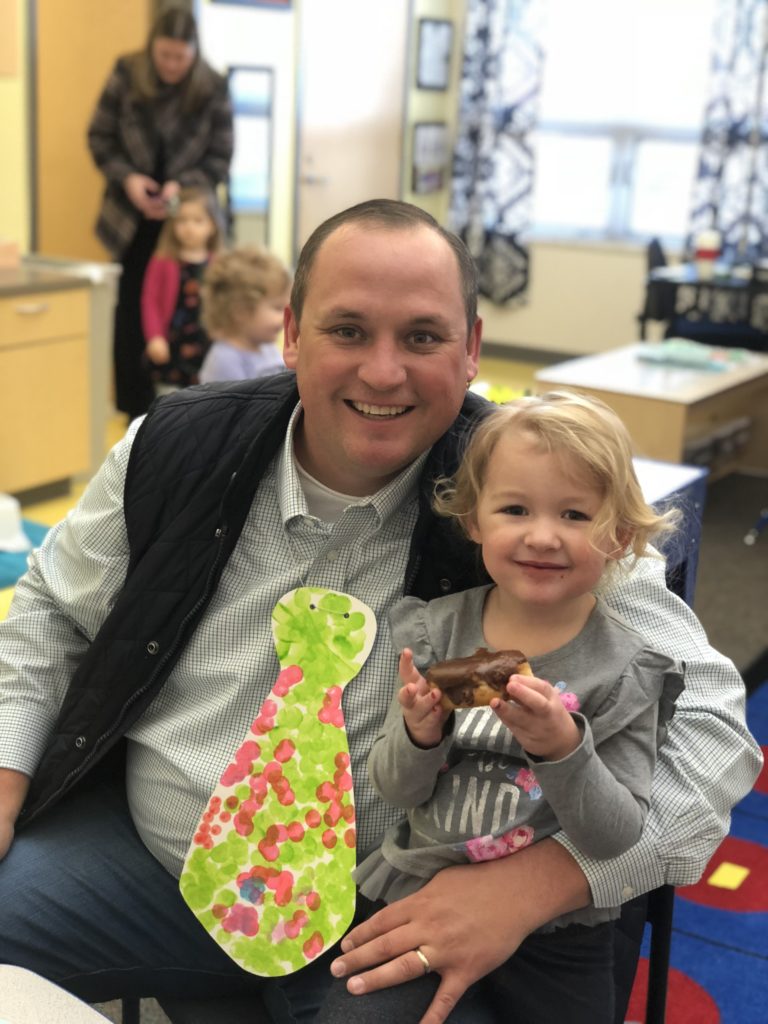
Photo courtesy of Walter Kenzie
“The one driving force for our entire team since last March has been supporting our community. Of course, we are focused on our own business, but we also are committed to our local communities and the entire industry. We’re truly all in this together,” Kinzie said.
“So, Walter, where were you when you heard Tom Hanks had COVID,” a Madeworthy reporter asked over Zoom. Kinzie grinned slightly and looked off briefly, his daughters squealing in the background. “You know, I don’t think I quite recall where I was,” he said.


 Sign in
Sign in

